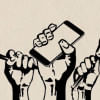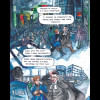Free pages, free lenses

In most parts of the world, editors are often requested to halt or alter a piece to be published. In cases of critical coverage, he or she is even attempted to be silenced or replaced. The methods of intervention range from a phone call to the editor followed by their media outlet being discredited and journalists being subjected to verbal and physical threats.
There's a reason why, between 2016 and 2021, 455 reporters died (according to Unesco), while 73 percent of 625 women journalists surveyed by the International Center for Journalists in 2020 experienced online violence, with nine out of ten cases remaining unsolved. There's a reason why only a few thousand stories see the light of the day and a million or more don't. There's a reason why some stories come dressed in propaganda, and some never get told in the absence of a good storyteller; why some go viral, and some are swept under the rug. Some just never get written.
He worked as a human rights advocate and was part of a local civil society organisation that used people to become citizen journalists. He was a reporter, a news presenter, and he was last seen leaving his workplace at 7pm on April 7, 2020. His last text said that he was surrounded by soldiers. There's a reason why Ibraimo Abú Mbaruco from North Mozambique went missing.
Today, in this shrunken courtroom of this world, Free Press is being hunted down and sent to oblivion. Impunity has been chosen as a key witness to nullify the existence of Free Press, and violence is being incentivised and prepared to deliver the master stroke of annihilation.
He was covering a violent dispersal of protests staged by members of the Gonabadi dervishes, a Sufi splinter group. It was February 19, 2018. There's a reason why Kasra Nouri, an Iranian journalist was sentenced to 12 years in prison, 74 lashes, two years in exile in a remote city, a two-year ban on political, social, and media activities, and a two-year ban on travelling outside Iran.
She was an Egyptian blogger, an internet activist, a social media coordinator, and a freelance journalist. There's a reason why, on October 12, 2019, a bunch of plainclothes security personnel in unmarked vehicles beat Esraa Abdelfattah, forcibly dragged her into one of their cars, handcuffed her hands and legs for almost eight hours and strangled her when she refused to give up the passwords to her phones.
There's a reason why Sandhya Ravishankar from Tamil Nadu was subjected to online harassment, death threats, rape threats, and doxing and why, in terms of freedom of press ranking, her country slipped to 161 from 150 in 2022, out of 180 countries, over the span of a year.
There's a reason why Katsiaryna Barysevich, a Belarusian journalist, got arrested on November 19, 2020 after having written an article on the death of a man who had protested and demanded the resignation of President Aleksandr Lukashenko, and was charged for "violating medical confidentiality with grave consequences."
There's a reason why, in the land that we live on, 217 journalists have reportedly been harassed, tortured and repressed in the last nine months and why one even died.
On October 17, 2023, a GD was filed at Hatirjheel thana. "I will shoot you," he said. "You will pay for it," he said. Thanks to technology, Jihadul Hassan, the journalist, had recorded the whole conversation. There's again a reason why Jihadul Hassan, the talk show host, was threatened, assaulted, and stifled for giving less airtime to one of his guests, a muscleman of a political party.
On September 24, 2023, a journalist answered his phone and all he heard was a menacing message from a member of the student wing of a political party: "Akhono shomoy achey bhalo hoye jan, noiley Nadim er moto mortey hobey." ("Change your ways while you still have time, otherwise you too will have to die like Nadim did.) The Nadim that he referred to was Golam Rabbani Nadim, a journalist who was beaten to death after reporting on the corruption of a local politician in June this year.
Also on September 24, Mosharraf Shah, a journalist and a fourth-year student of Chittagong University, was threatened, beaten severely, and warned against publishing negative news on a student wing of a political party. At 11am, in broad daylight, Mosharraf was punched, kicked, and beaten mercilessly.
This overall deterioration of the spirit of free media should not only be attributed to governments' desire to control. In spite of instructions, directives, and powerful phone calls from powerful places, there are pens that fight against injustices, corruption, and human rights violations; there are papers that expose the ploys of greed and cruelty; there are lenses that attempt to capture real moments. The real weakness lies in those of us who cave in to calls to drop stories or rescript them.
The practice of running blank editorials as a mark of protest occurred in Ukraine in 2012, Hungary, Estonia and Bolivia in 2010, Slovakia in 1997 and, much before any of them, in India in 1975. All the newspapers in India ran a blank editorial space on June 28, 1975, representing the censorship by the then government in the name of Emergency. The refusal to pen a column that day spoke for the entire Indian nation. That is how a whole nation came together back then.
Most unfortunately, today, the Free Press has taken the stand and is being charged for killing the rhetoric of the land, for spreading "negative and unobjective information," "demonstrating illegally," and "using violence to assault police and damage public properties." Today, in this shrunken courtroom of this world, Free Press is being hunted down and sent to oblivion. Impunity has been chosen as a key witness to nullify the existence of Free Press, and violence is being incentivised and prepared to deliver the master stroke of annihilation.
Every morning, I have the habit of watching YouTubers from all over presenting their side of the story. Some speak the truth with venom, some use slang to slay the images of powerful leaders. That is painful to watch. Some challenge and predict the fall of governments with imaginary dates and concocted data. That is dreadful to digest. In a sane world, none of this would have happened if only a little space for democratic tolerance could be carved out of the pockets of rulers. In the absence of a decent discourse on governance, and in the presence of fear lurking in the shadows, what else can we expect to read, watch, and listen to but total dissent pouring in through various media channels, defying borders, and kissing the skies of Free Press above.
Dr Rubana Huq is vice-chancellor of Asian University for Women.
Views expressed in this article are the author's own.
Follow The Daily Star Opinion on Facebook for the latest opinions, commentaries and analyses by experts and professionals. To contribute your article or letter to The Daily Star Opinion, see our guidelines for submission.

 For all latest news, follow The Daily Star's Google News channel.
For all latest news, follow The Daily Star's Google News channel. 











Comments